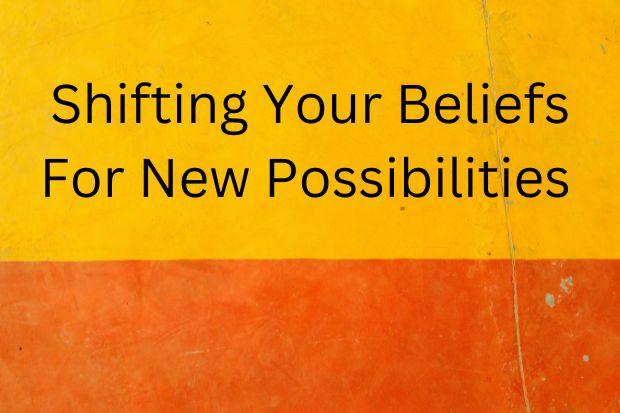Is shifting your beliefs possible? Find out what it takes to make a leap in your belief system to think and respond in a different manner.
I tend to stay far away from the political arena on my blog and even in my personal life. Why go there? Discussing politics seems to lead into conversations I would rather avoid. Everyone tends to be comfortable in their belief systems and I doubt any Facebook post has ever changed anyone’s mind about who they are going to go and vote for. That being said, it does bring up an interesting discussion on beliefs and how we form our belief systems.
“Whatever you believe will be true for you.”
What is a Belief?
So, just what is a belief and how are beliefs formed? Straight from Google search engine, the definition of a belief is:
- An acceptance that a statement is true or that something exists.
- Something one accepts as true or real; a firm held opinion or conviction.
I look at a belief as a collection of thoughts that we have put together in some sort of sequence. The way I would describe a belief is rather like this: “something happened; then something else happened as a result, so therefore…XXX must be true.” This seems to be the way many political beliefs develop, in my opinion.
Many beliefs form at a young age. Your family in many cases developed the core of your belief system. Friends, teachers, and mentors can also be sources of beliefs. Your circumstances also form your belief system. Being fired or laid off from a job can lead to adopting a certain set of beliefs around employment and business.
Changing your Beliefs
That is a word we do not like to hear: change. We are comfortable with how we make sense of our own worlds through our beliefs. When someone shows up in our lives with another idea, we tend to dismiss it as wrong. After all, you took the time to form that belief and you own it now. Anyone challenging that threatens what you have come to see as true. It makes us uncomfortable.
By closing down our minds to new information, we also end up closing down our intuition and the intuitive process. That keeps us stuck in situations that may not be in our best interest.
Shifting your Beliefs
Try this exercise and see if you can shift your belief about something. Pick just one thing that you believe to be true and hold it in your mind. Now, I want you to imagine that the exact opposite is true. I want you to envision how your life would be different and all the different scenarios that could play out if the opposite of your current belief was true. Hold it in your mind as long as possible. Aim for one to two minutes.
So, what happened? Were you able to hold that thought or vision that long and stay open enough to the possibilities, or was the emotional charge and attachment to that thought too much? Did you end up shutting down the vision in frustration or disgust? Was the thought disturbing to you? I would love to hear your responses in the comments.
Although this may be challenging in one area like politics it could be easy in another area like money. Try out this exercise in a few different aspects of your life, such as relationships, money, or family issues.
A Working Example of Shifting Your Beliefs
Okay, let’s look at how this would actually work for shifting your beliefs.
I am going to choose a common social belief and then work through the thought process of examining that belief.
Let’s say your belief is the following: My needs are not as important as those of my family.
So, what is the opposite of that? My needs count and are equally as important as those of others. My needs are respected and honored.
Now, ask yourself these questions:
If that were true, how would your life be different? Perhaps you would take time for yourself and not feel as though it was selfish of you to do so. Perhaps you signed up for a yoga class.
If that were true, how would you feel? Would you feel more connected and a contributing part of your family? You may not think so at first, but by acknowledging your own needs and acting upon them, you can contribute so much more to your family as a result.
If that were true, how would you react to others? Would you understand and acknowledge others feelings, but hold firm on your decisions instead of ignoring your own needs. (“No, tonight is my night for yoga class, so you need to make dinner on your own tonight.”
Realizations
If you found yourself coming up with a bunch of “what ifs” or “reasons” why you could not take time for yourself, or thoughts of “oh, they don’t know how to cook anything”, just realize that is a belief right there. Is that really true? Has that belief outlived its usefulness? Are you willing to let that belief go?
How would your life be different? Perhaps you would make new friends at the yoga class or make a few business contacts that could help you in the future. Would you feel more energized and have a better attitude?
By examining your beliefs through a different lens, you become aware of the origins of those beliefs and your level of attachment to them. You may have thoughts of your parents or grandparents coming to mind and what their thoughts and beliefs were about a particular subject.
Is there a right or wrong answer? Are there good or bad beliefs? No. Just what you believe to be true for you today. What if you were to choose just one belief to change or challenge today? How would your world change if you began shifting your beliefs?
